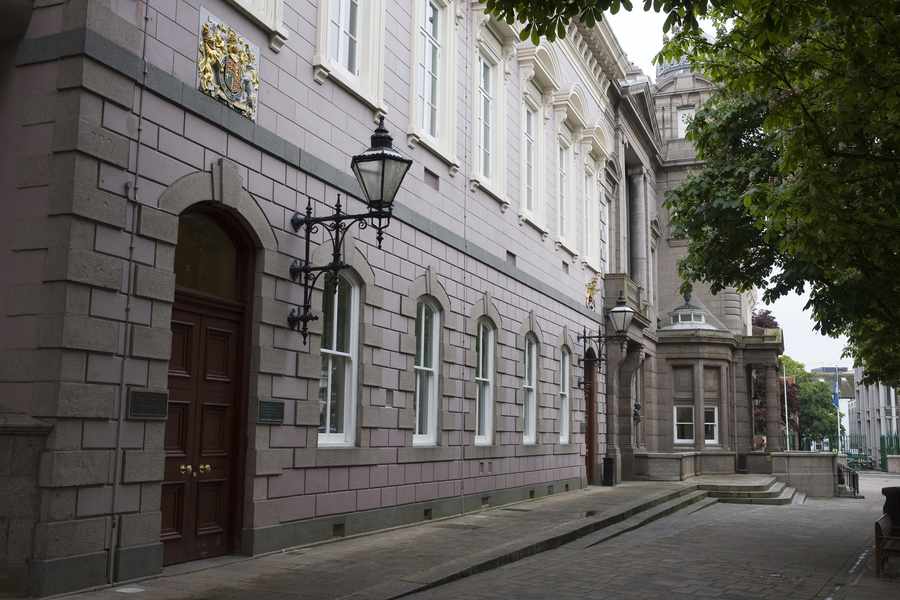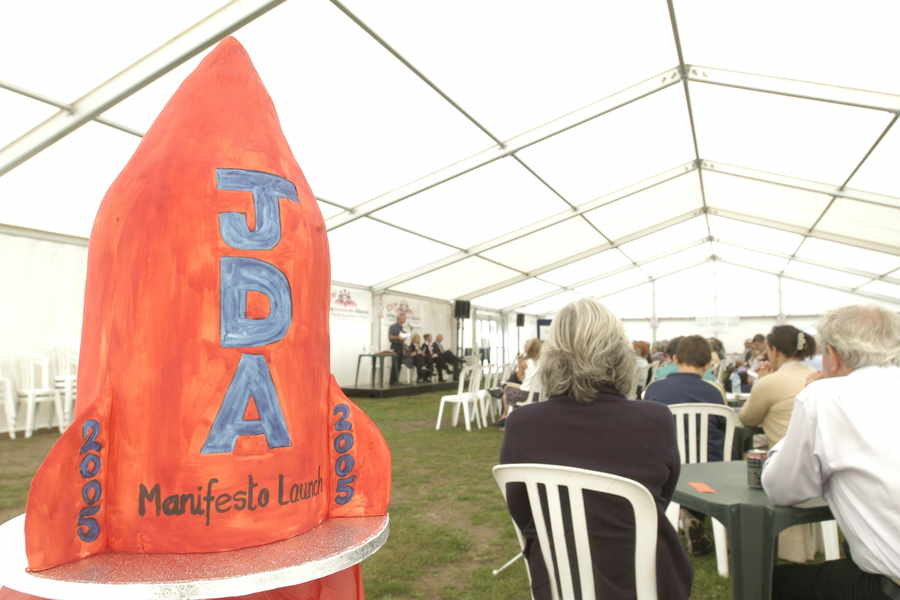In what is expected to be a very short sitting for the Assembly, just seven oral questions are due to be asked and four matters due to be debated – all of which are expected to be minor items to consider. It is likely that the sitting could be finished by lunchtime on Tuesday.
And of the questions due to be asked in the Assembly only one – from Deputy Kevin Lewis about a delay to a new roadworks law – is from a politician who is not a member of the political party Reform Jersey. The remaining questions are all from Deputies Geoff Southern, Montfort Tadier and Sam Mézec.
Party chairman Deputy Mézec said: ‘Reform Jersey believes that question time in the States is a fundamental part of democracy and an important opportunity to hold ministers to account. We meet every week to coordinate how we can do this to make us more effective. This is one of the many benefits of party politics.
‘To see that we are virtually the only States Members asking questions this week sort of vindicates the comments I made in my letter to the JEP recently about Reform Jersey being the real opposition in the States.’
Items due to be considered during public business include giving the military unit on board HMS Iron Duke, which is affiliated with Jersey, the military rights to march through the Island. Members will also be asked to ratify a tax information exchange agreement between Jersey and Romania.

Meanwhile, Scrutiny hearings are also due to resume this week. On Monday the Health and Social Security Scrutiny Panel was due to receive its quarterly update from Health Minister Andrew Green and Corporate Services was due to question Chief Minister Ian Gorst as part of its review of plans for the next Medium Term Financial Plan, which sets States spending.
That review is due to continue on Wednesday with evidence from Treasury Minister Alan Maclean. And on Thursday Planning Minister Steve Luce is due to give his quarterly update to the Environment, Housing and Technical Services Scrutiny Panel.

Ian Heath examines Jersey’s political make-up:
There were lessons to be learned after the squandering of nearly £500,000 on planning the doomed Port Galots project, the most important being to listen to the locals.
I just hope the States do so when it comes to the proposed development of almost 300 new homes at Gas Place. Opposition to the scheme last week came in the form of an almost unanimous vote against it at a Town Hall meeting and a petition signed by hundreds of Islanders.
The politicians of St Helier and St Saviour voted overwhelmingly in the States Assembly in support of the petition to prevent the development of the land for anything other than the extension of the Millennium Town Park.
Only one out of the 16 Constables and Deputies representing the two parishes, which make up almost half the Island’s population and will be most affected by the scheme, voted against the petition.
The Constable of St Helier has also openly criticised the plans and urged States Members to ‘take a step back’ and consider the situation.
The feelings of the people in the area appear to be very clear – they do not want this development to go ahead. Senator Gorst described himself as having a ‘heavy heart’ when he asked the Assembly to throw out the petition, which they did, and he must continue to give this matter a great deal of consideration.
As a town resident, for me the thought of another 1,000 people living in Gas Place, bearing in mind what the Millennium Town Park has brought to the area, is worrying. The park has breathed life into a rundown part of town and I would hate to see it ruined by neighbouring premises becoming over-developed.
And the potential traffic congestion in the area, which contains a concentration of secondary schools and soon two large supermarkets, must have alarm bells ringing. The extension of the park should not be the only option available to developers, as per the petition, but 298 more homes in the area just seems too many.
Town voters maybe missed a trick by not turning out in sufficient numbers in last year’s referendum on electoral reform.
A vote for change would have seen the St Helier and St Saviour electorate better represented in the States Assembly and they would have had more voice and votes in such planning issues.
But it might not just be the residents of those parishes who end up paying a price. If thousands are spent on plans again only for local residents and businesses to protest and block them at the 11th hour, as with Port Galots, it’s everyone’s money that will be wasted.
Fairer electoral representation in Jersey could help reduce these sort of risks.
But then again, the States simply listening to people when it’s obvious that they do not want something ought to be enough.


The full list of oral questions to be asked in the States on Tuesday 3 February. (Members have 120 minutes to discuss the questions)
1. Deputy S.Y. Mézec of St. Helier will ask the following question of the Minister for Treasury and Resources – “What action, if any, has the Minister, as the shareholder representative of JT, taken to bring about a solution to the Gigabit dispute and what further measures does he have under consideration to deliver progress?”
2. Deputy M. Tadier of St. Brelade will ask the following question of the Minister for Education, Sport and Culture – “What statistical information, if any, does the Minister have to support the statement on page 11 of the Council of Ministers’ Strategic Priorities document that ‘the Island has been overtaken’ in GCSE results by England?”
3. Deputy G.P. Southern of St. Helier will ask the following question of the Minister for Social Security – “Will the Minister inform members of the number of sanctions imposed on job seekers for leaving a job without sufficient reason or failing a task by quarter since the adoption of P.101/2013 (Income Support (Miscellaneous Provisions) (Jersey) Regulations 2013) and detail the measures, if any, which have been put in place to assess the impact of these sanctions on the behaviour or well-being of those sanctioned?”
4. Deputy K.C. Lewis of St. Saviour will ask the following question of the Minister for Transport and Technical Services – “Will the Minister inform members why there is a delay in implementing the ‘draft Road Works and Events (Jersey) Law 201-‘?”
5. Deputy S.Y. Mézec of St. Helier will ask the following question of the Chief Minister – “What consideration, if any, has the Chief Minister given to reforming the administrative structure of the Parish of St. Helier in order to move more towards a Council system as part of the ‘new deal’ for St. Helier?”
6. Deputy G.P. Southern of St. Helier will ask the following question of the Minister for Social Security – “Does the Minister support the introduction of an empty property tax as a method to help alleviate the housing shortage and bring down rental prices?”

‘We are facing three years of a government which will attempt to force through unpopular measures to hide the dire financial state in public funds they have created, and most States Members will simply nod them through unquestioningly.
‘At the same time our Chief Minister is trying to create a public image that he is a caring leader by proclaiming that he will prioritise reducing poverty, yet has refused calls to raise the minimum wage, thus proving that his claims were completely insincere.What I cannot agree with is that there is no opposition in the States any more.
‘There is an opposition and it’s called Reform Jersey. Any casual reader of the JEP will have noticed that it is Reform Jersey’s States Members who have been dominating States question time and have been putting forward proposals to try to undo some of the damage being caused by the Council of Ministers.
‘Despite only having three States Members we are able to punch well above our weight because we are well organised and because we work together towards a common vision. That is why Jersey needs party politics. Reform Jersey does not claim to have all the answers, which is why we would urge any Islander who feels disaffected with the current government to join us.

‘WE ARE not interested in opposition. We are out to take the government. We shall have 5,000 members by the time we hold our meeting in July, and 10,000 by the time of the elections. We are going to absolutely smash them to pieces in the next election.’
So spake former Senator Ted Vibert on the night of the launch of the Jersey Democratic Alliance in April 2005.
In the cold glare of hindsight, Mr Vibert’s bold predictions about the future of the JDA bring to mind Comical Ali, the Iraqi information minister who claimed that American troops approaching Baghdad would ‘surrender or be burned in their tanks’ during the second Iraq War.
But there was a point during the summer of 2005 when the only phone number that a journalist needed was Ted Vibert’s.

He was everywhere. He fronted a controversial blog that was debated on the floor of the States Chamber (ring any bells?), came reasonably close to winning a censure vote against the then Policy and Resources president Frank Walker that would almost certainly have forced Senator Walker’s resignation, allegedly punched the then Deputy Philip Ozouf during a row in the States Building and was given a sustained standing ovation by more than 1,000 Islanders at the launch of the JDA at Fort Regent.
Just a few weeks later, he was forced to step down from the party – and the States – because of ill health.
The party lost its leader, its momentum and its direction. Over the last few weeks the wheel has come full circle. Mr Vibert returned and the JDA effectively imploded, with three of its four elected members announcing this week that they had resigned from the party.
Far from taking government, changing the face of Jersey’s politics, or contesting all 11 Deputy’s seats in St Helier – all promises made on that strange night in April 2005 – the JDA, at its absolute height, held four seats in a States Chamber of 53.
In fact, of the 12 occasions that the party backed candidates in elections between 2005 and June this year, only four times were JDA candidates elected to the States – all during the latest Deputy elections in 2008.
Three JDA members were elected in the Deputies’ election in 2005 but campaigned as independents – only to reclaim their party membership after the election. (One of them, Deputy Judy Martin, quit the party entirely soon afterwards.) But if the 2008 campaign was the high watermark for the JDA, it was not without its problems.
Two members – Deputies Geoff Southern and Shona Pitman – were fined a total of £12,000 after they admitted breaking the Public Elections Law by illegally helping voters to apply for postal votes, after saying during the debate on the law just months before that they had no intention of obeying it.

While their prosecution was being dealt with, Deputy Southern tried to persuade the States to repeal the law that he was charged with breaking, without success.
And in June this year Deputy Southern decided to stand in the Senatorial by-election created by the disqualification from office of Senator Stuart Syvret, who lost his seat after spending six months in self-imposed political exile in the UK.
Despite initially saying that he would not stand against Mr Syvret, he decided to do so, setting up an acrimonious split with the darling of the political left in Jersey and setting himself up for a mighty fall.
His fifth-placed finish with just over 1,000 votes was scarcely a ringing endorsement of JDA policies, and the post-election spin by the party that he only lost because he was already in the States was at best an admission that his candidacy had been a big mistake, and at worst thoroughly disingenuous. It was also the beginning of the end for the party.
The three Members who left the JDA – Deputies Shona and Trevor Pitman, and Debbie De Sousa – say that it was one of the things that brought tensions within the JDA to a head.
The other shows the deeper problem with the JDA. The Members who have left the party, and those who remain, have separately claimed that the split was caused because each side wanted to move away from the ideological-left, old-school Labour policies that it had promoted. The fact that both sides share the same view of what the problem was, and the solution to it, suggests that there is more to the split than just political differences.
In fact, if you look at some of the key points about the party – pressing for higher pay settlements to States workers, opposition to public- sector cuts, a fixation on benefits and taking large amounts of funding from unions, particularly Unite – they all say ‘left-wing’.

But its members would never accept that. ‘Social justice’, ‘progressivity’ and ‘centreleft’ were the vague buzzwords that they chose to define their aims and attitudes – and they sought to claim the centre ground by labelling the politicians with whom they disagreed as an extreme right-wing political establishment, in effect trying to rearrange the whole political landscape around themselves.
Even when they slipped away from the ideological stuff, the members had a tendency to get bogged down in no-hoper arguments about scrapping the role of Bailiff, getting rid of the Constables, or rescinding the part of the election law they were accused of breaking.
That is not to say that the story of the JDA is one of absolute failure. There were occasional victories – Deputy Southern’s securing of £10 million for the Millennium Town Park (thanks to Senator Alan Maclean’s ringbinder) marked the point at which more than a decade of talk about the park turned to action.
And their pursuit of compensation for Woolworths workers made redundant by the collapse of the company was a successful one, followed up by agreement for a law to protect redundancy payments for workers from all insolvent firms.
But if the driving focus of the JDA was to prove that party politics could work in Jersey, the experiment can only be regarded as a failure.
Their record of winning just a third of the elections in which they fielded candidates shows that the idea never caught on with the public, and their failure to persuade more electable candidates or sitting politicians to join them – despite the promise of union donations to fund campaigns – shows that they were equally unsuccessful in persuading their peers of their credibility.
Jersey’s history of political parties is patchy at best – for all the talk of the Laurel and the Rose, Magots and Charlots, the Jersey Democratic Movement and the Progressive Party, political parties have come together briefly, and for a particular purpose, flared for a moment, and then died.






